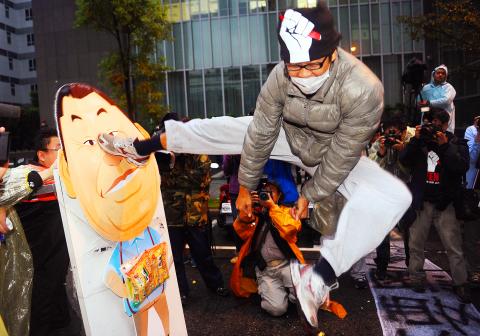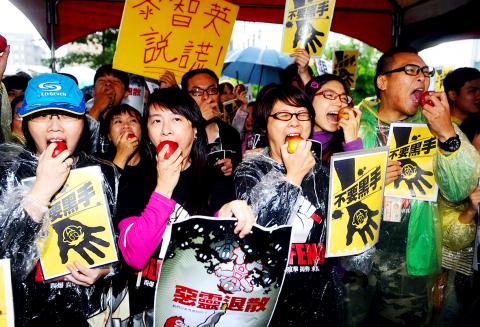Media activists, supporters and employees of Next Media Group’s (壹傳媒集團) four Taiwanese media outlets staged a demonstration outside the group’s headquarters in Taipei yesterday, accusing management of lying while urging the prospective buyers to respect editorial independence.
Despite the cold weather and pouring rain, more than 100 Next Media employees held up signs and chanted in unison: “We want our Apple, down with intervention.”
Since Hong Kong Media mogul Jimmy Lai (黎智英) announced that he was selling his four outlets in Taiwan — the Apple Daily, the Sharp Daily, Next Magazine and Next TV — for NT$17.5 billion (US$600 million), the deal has drawn a lot of attention.

Photo: Chang Chia-ming, Taipei Times
“When the boss wants to sell the group, he sells it without consulting or even telling us. When they want to sign the contract in Hong Kong, they unilaterally make that decision. Now that they want to postpone the signing, they call it off. What about us, the employees,” Apple Daily reporter Huang Yang-ming (黃揚明) asked.
“How long are they going to deceive us? We are employees of the group, but the only way we learned that Next Media Group would be sold was when we saw it on the news,” he said.
Apple Daily Union president Tsai Jih-yun (蔡日雲) accused management of lying to employees and asked Lai, Next Media Group executive director Cassian Cheung (張嘉聲) and Chinatrust Charity Foundation chairman Jeffrey Koo Jr (辜仲諒), who is one of the potential buyers, to apologize to the group’s employees.

Photo: Chang Chia-ming, Taipei Times
Tsai said that when the rumor first emerged that Want Want China Times Group (旺旺中時集團) chairman Tsai Eng-meng (蔡衍明) was one of the three major investors in the deal to buy Next Media, Lai, Cheung and Koo all denied it.
Lai went as far as saying that allowing Tsai Eng-meng to buy Next Media would be a humiliation to him.
“Now that it has been proven that Tsai Eng-meng is one of the investors, [it emerges that] Lai has not only lied to his employees, but has also humiliated himself,” Tsai Jih-yun said.
“We therefore ask the three men who have lied to Next Media employees to apologize,” Tsai added.
She called on management, as well as the prospective buyers, to meet with representatives from the union to discuss matters relating to protecting employees’ rights and editorial independence.
Tsai Jih-yun said the union has made the request many times, but management has repeatedly ignored their demand.
Next Media employees are particularly worried about interference in news reporting and editing after learning that Tsai Eng-meng would be one of the new owners, given the tycoon’s record with the media outlets under his Want Want China Times Media Group.
“We’re concerned about editorial independence, as Tsai Eng-meng has a history of interfering in news reporting. Freedom and independence in the editorial room are the core of a news outlet,” an Apple Daily employee surnamed Hsiao (蕭) said.
Next TV Union president Cheng Yi-ping (鄭一平) said it was intolerable that Next Media employees have to learn about the latest progress in plans to sell the group via other media outlets, instead of being informed directly by management.
“The Next TV Union has two demands for the management,” he said. “First, we demand more transparency, and second, we urge management to hold talks with the union immediately.”
Prior to yesterday’s demonstration, hundreds of Next Media employees and media reform activists staged an overnight candlelit rally outside the group’s headquarters.
Next Media spokesman Chang Hsiu-cher (張修哲) said that Next Media and the buyers were set to wrap up the deal and ink a contract yesterday, but the signing of the contract has been postponed.
The consortium, led by Koo, also includes Formosa Plastics Group (台塑集團) chairman William Wong (王文淵).
Formosa Plastics Group yesterday said issues such as whether the deal would go through and when the contract would be signed depend on Koo because the Financial Supervisory Commission has said that Koo should cut his proposed shareholding to less than 20 percent. A report by the Chinese-language United Daily News said that the trio had reached an initial agreement on Wednesday in which Koo and Wong would each hold 34 percent of the shares, while Tsai Eng-meng would hold the remaining 32 percent.
When asked whether there would be a fourth buyer in the deal, Formosa Plastics Group said “it really doesn’t know.”

INVESTIGATION: The case is the latest instance of a DPP figure being implicated in an espionage network accused of allegedly leaking information to Chinese intelligence Democratic Progressive Party (DPP) member Ho Jen-chieh (何仁傑) was detained and held incommunicado yesterday on suspicion of spying for China during his tenure as assistant to then-minister of foreign affairs Joseph Wu (吳釗燮). The Taipei District Prosecutors’ Office said Ho was implicated during its investigation into alleged spying activities by former Presidential Office consultant Wu Shang-yu (吳尚雨). Prosecutors said there is reason to believe Ho breached the National Security Act (國家安全法) by leaking classified Ministry of Foreign Affairs information to Chinese intelligence. Following interrogation, prosecutors petitioned the Taipei District Court to detain Ho, citing concerns over potential collusion or tampering of evidence. The

‘FORM OF PROTEST’: The German Institute Taipei said it was ‘shocked’ to see Nazi symbolism used in connection with political aims as it condemned the incident Sung Chien-liang (宋建樑), who led efforts to recall Democratic Progressive Party (DPP) Legislator Lee Kun-cheng (李坤城), was released on bail of NT$80,000 yesterday amid an outcry over a Nazi armband he wore to questioning the night before. Sung arrived at the New Taipei City District Prosecutors’ Office for questioning in a recall petition forgery case on Tuesday night wearing a red armband bearing a swastika, carrying a copy of Adolf Hitler’s Mein Kampf and giving a Nazi salute. Sung left the building at 1:15am without the armband and apparently covering the book with a coat. This is a serious international scandal and Chinese

Seventy percent of middle and elementary schools now conduct English classes entirely in English, the Ministry of Education said, as it encourages schools nationwide to adopt this practice Minister of Education (MOE) Cheng Ying-yao (鄭英耀) is scheduled to present a report on the government’s bilingual education policy to the Legislative Yuan’s Education and Culture Committee today. The report would outline strategies aimed at expanding access to education, reducing regional disparities and improving talent cultivation. Implementation of bilingual education policies has varied across local governments, occasionally drawing public criticism. For example, some schools have required teachers of non-English subjects to pass English proficiency

TRADE: The premier pledged safeguards on ‘Made in Taiwan’ labeling, anti-dumping measures and stricter export controls to strengthen its position in trade talks Products labeled “made in Taiwan” must be genuinely made in Taiwan, Premier Cho Jung-tai (卓榮泰) said yesterday, vowing to enforce strict safeguards against “origin laundering” and initiate anti-dumping investigations to prevent China dumping its products in Taiwan. Cho made the remarks in a discussion session with representatives from industries in Kaohsiung. In response to the US government’s recent announcement of “reciprocal” tariffs on its trading partners, President William Lai (賴清德) and Cho last week began a series of consultations with industry leaders nationwide to gather feedback and address concerns. Taiwanese and US officials held a videoconference on Friday evening to discuss the